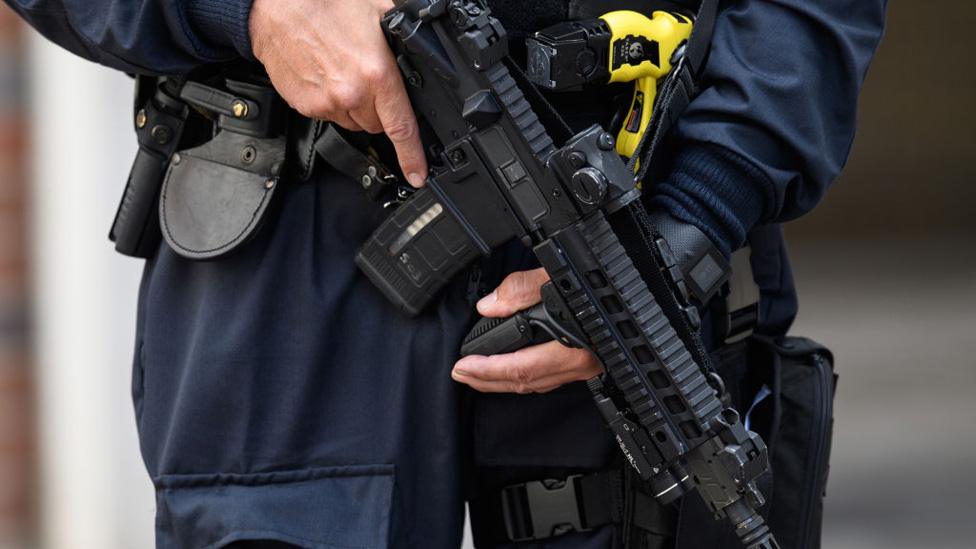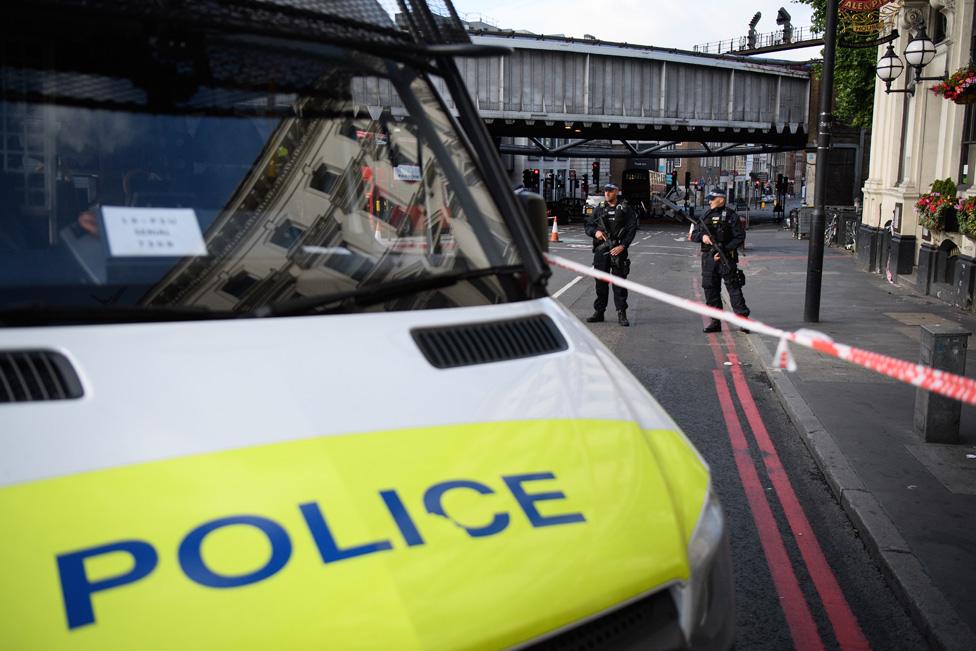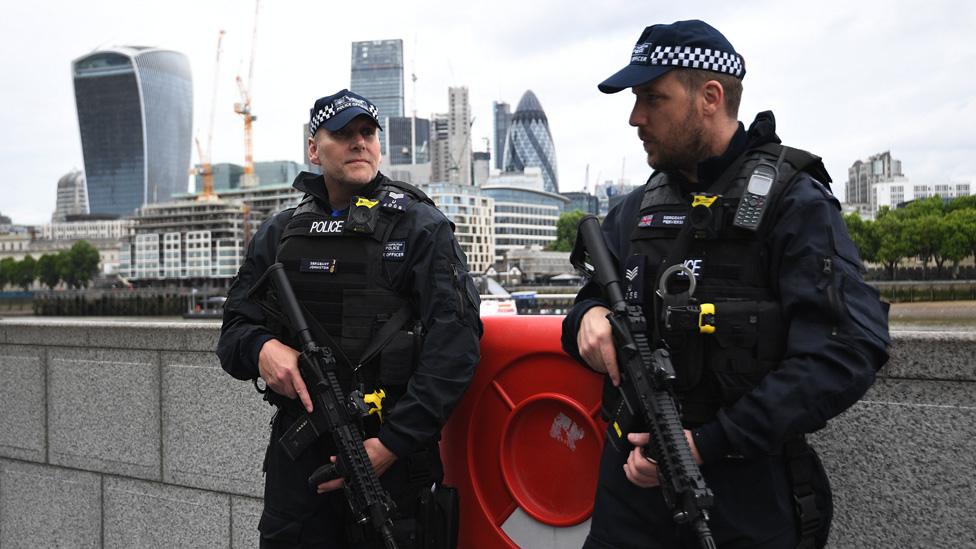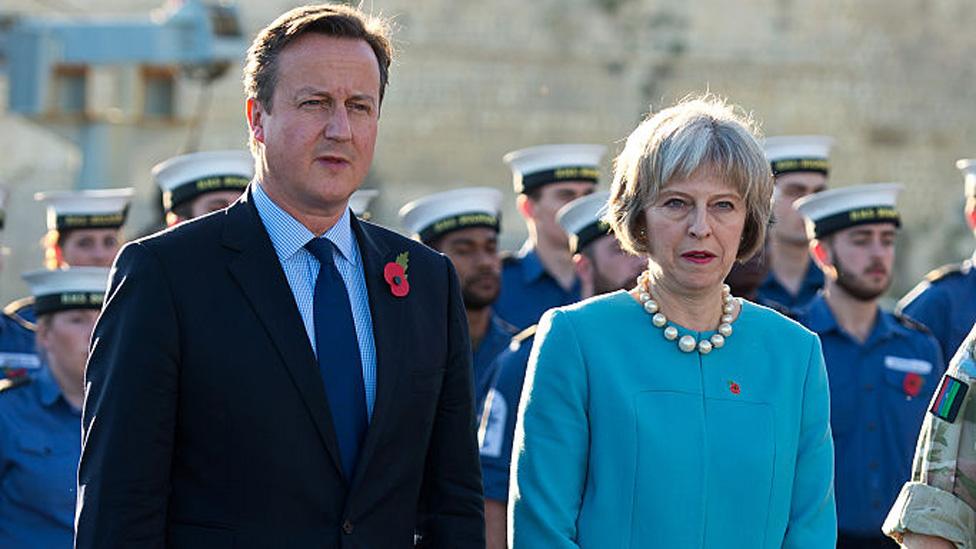London attack: What new anti-terror powers could be used?
- Published

Recent attacks in London and Manchester have sparked calls for something to be done about the UK's counter-terrorism laws. But what could an incoming government practically achieve by creating new powers to pursue and lock up suspects?
What is Theresa May proposing ?
The PM said she would make it easier to deport foreign terror suspects and "restrict the freedom and movements" of those that present a threat.
"And I mean doing more to restrict the freedom and movements of terrorist suspects when we have enough evidence to know they are a threat, but not enough evidence to prosecute them in full in court," she said.
"And if our human rights laws get in the way of doing it, we will change the law so we can do it."
This looks very much like an attempt to return the current TPim restrictions - a form of house arrest - closer to what they used to be when they were called control orders. Those orders were created by Labour in 2004 and they included long curfews and restrictions on who people could meet and communicate with. They were abolished by the Conservative-Liberal Democrat coalition and replaced by less restrictive TPims in 2011.
The human rights law issue may be less dramatic than it sounds. States can "derogate" or suspend their observance of parts of the European Convention of Human Rights if they need to. Tony Blair's government did it in 2001 to create a form of detention without charge for foreign suspects who could not be deported - something I will come back to.
What about the criminal law?
Many terrorism suspects are not put on trial for terrorism offences because there are other tools in the criminal law box that are right for the job.
So, for instance, had one of the London attackers survived, he would have been charged with murder.
Parliament has seen no need to create a separate offence of "terrorism murder". The mandatory sentence for murder is already life.
Judges can order that life means life - no chance of parole - which is exactly what Michael Adebolajo got after his trial and conviction for murdering Fusilier Lee Rigby. Thomas Mair got the same sentence for killing MP Jo Cox.
What about a terrorist bomb plot? Again, no need for special crimes. Really important Victorian law covers explosives - both their possession and use. , external
If violent extremists are plotting together, the group can be jointly charged with conspiracy - an agreement to commit a crime.
The additional terrorism offences that have been created over the past 17 years fill in the gaps between all the existing offences covering violence.
These days, the most regularly used offence is the crime of preparing an act of terrorism. Parliament designed it to allow the police to arrest and charge at the earliest possible stage of a plot to minimise the risk to public safety.

There are other offences such as possessing information useful to terrorism that covers everything from a bomb manual to an extremist publication.
But sometimes these crimes become quite complicated to present to a jury, particularly around the accusations of encouraging or glorifying a particular act. The definition of terrorism is quite long and complex - and prosecutors like to keep things simple for members of the public who have to decide a suspect's fate.
One crime that has been occasionally talked up in relation to terrorism is treason. This law is so old it's written in medieval French. , external
So how is the 1351 act relevant today? Because it's about "waging war" against one's own land. When he was foreign secretary, the Conservative Philip Hammond mused that it could be thrown at British fighters in Syria who'd "sworn personal allegiance" to ISIS.
That's never happened - specialist terrorist prosecutors have always found another crime that is more fitting - such as membership of a terrorist organisation.
What about sentencing?
Preparing an act of terrorism, which has been used incredibly successfully against Syria-linked suspects, carries a maximum life sentence. Given this crime, murder, conspiracy and attempted murder can get someone locked away forever, it is difficult to see where else sentencing could go - unless Parliament wants to increase sentences for lesser offences, such as those committed by people supporting the violent actions of others.
Once someone is released, there are post-sentence powers to force them to notify the police of their movements, such as changes of address and so on, but these are very basic.

Some people regularly talk about bringing back the death penalty. The UK, through its own choice, adopted the measure in the European Convention on Human Rights (which is nothing to do with the EU or Brexit) that required the abolition of capital punishment in all circumstances. We are legally a world away from the noose.
Powers short of a criminal conviction
Since 9/11, the UK has introduced lots of powers to deal with terrorism outside of the criminal law - all of these are aimed at people that MI5 thinks are up to no good, but the police can't get the evidence to get them into a criminal court.
The home secretary can cancel passports, temporarily exclude a British national, freeze assets and strip British nationality from people with dual citizenship so they can be barred from the country.
What about internment - detention without charge?
Before TPims and their predecessor control orders, Tony Blair's government tried detention without charge for foreign national terror suspects who could not be deported. That was thrown out by the UK's highest judges - and it was as politically controversial as the hated internment camps during Northern Ireland's Troubles.
If people want to see internment back, they have to ask themselves who exactly they want to see held, for how long, on what grounds. Would it actually work? In Northern Ireland, it was a recruiting sergeant for the IRA.
When David Cameron was PM and Theresa May at the Home Office, they proposed a counter-extremism bill aimed at controlling the behaviour of people who oppose British values but stop short of turning to violence.

David Cameron and Theresa May in 2015
The proposal included "extremism disruption orders" to stop individuals engaging in extremist behaviour and closure orders to deal with premises used to support extremism.
Some of the ideas were considered 12 years ago after 7/7 and knocked on the head as unworkable.
Why? Because government lawyers have struggled to come up with a clear-cut legally unambiguous definition of extremism.